11 Reasons Why Your Blog Isn’t Working and Getting Traffic

Blogging is easy. It takes something like 15 minutes to buy some hosting, set up a domain name, throw WordPress on the host, and set up a site. You can be writing for the internet in under an hour.
Blogging is, to many people's surprise, incredibly difficult to do properly.
If your goal is just to publish words on the web, well, that's trivial. If you're looking to boost sales on a store, grow an audience, sell a product, sell yourself as a consultant, or accomplish anything at all with your blog, it's an entirely different story.
The days when you can just write a blog and gain exposure by the virtue of being one of the few people to cover that topic are long over. These days, you have to concern yourself with things like search engine's impressions of content quality, maintaining a consistent schedule, technical SEO, creating attractive graphics, formatting your posts properly, having a fast loading and user-friendly website, and advertising; and all of that just puts you at the starting line.
It's no wonder that thousands of businesses just pay a content marketing team to do it for them.
If you've set up a blog and you're failing to gain traffic, a lot of different things could be at issue. I've come up with what (in my experience) are the eleven most common issues. Audit your site and look for these issues, and if you have them, fix them. It won't make you a #1-on-Google-blog overnight, but it will help you get over the initial hurdles.
1. Poor Quality Content
Good content is an investment. True high-quality content has a purpose behind it and is focused on a specific type of person researching a specific topic. It educates readers. It teaches them how to perform a task. It solves a problem for them.
Think about how you find content for a moment. You're either looking for a specific piece of information – the answer to a question or the solution to a problem – or you're looking to perform a task, such as reading product reviews, preparing for a project, or otherwise trying to soak up information on a subject. Everyone writing content for the web needs to pay attention to what the core purpose of their post is.
Every few months for the last few years, someone publishes a post like this one, written by a piece of software rather than a person. I've had a lot of people ask me if I'm scared that these machines are going to take over my job.
You know what? Not really. The trouble with these kinds of robots is two-fold. First, they have to be trained on existing content, which had to be produced by someone. Second, they don't add real insights or first-hand experience.

Artificial intelligence doesn't know how to solve many problems if no one else has written the solution down already. Artificial intelligence doesn't have the critical thinking to look at the underlying reasons behind information to give it form and substance. At least, not yet.
Superficially, these articles look like good blog posts. When you get right down to it, though, they're little more than spun content. They lack the one thing that separates a good blog post from a bad one: value.
Similar to these robotically-written blog posts, articles from content mills can look good at first glance, but they aren't addressing the topic. They are re-phrasing content that already exists and making sure it is free of grammar and looks good at first glance. The writer hopes that their article passes your sniff test; that you read the first paragraph or two and ultimately accept the article so that they get paid. What if you challenge yourself to read each of your outsourced articles in an attempt to learn more about those topics? Did you learn anything, or did they just talk around in circles? Were 90% of the articles "fluff" content, or were they discussing things that you didn't already know about? Would you share one of them with a friend?
On a technical level, make sure your content meets the hallmarks of good quality content. It should be at least 1,500 words to compete with the average word count, though I tend to prefer 2,000+, as it's difficult to compete with a group of people by matching exactly what they are doing. Run it through a check (or two) to ensure your content has no spelling or grammar errors. Take your time with every blog post. Ideally, these articles should be on your website for life, so rushing them is going to hurt you later.
2. Poor Topic Choice
Years ago, it was pretty common to "follow" or subscribe to a blog. You might bookmark it and check it regularly, or add it to an RSS feed reader. Social media gave people a new (and much easier) way to follow their favorite creators.
These days, I don't know many people who follow specific blog content creators, outside of certain exceptions. Fiction and media creators, sure. Blog posts from marketers and entrepreneurs, for example? Not quite as common. Sure, you'll see news and Buzzfeed posts, but how often do you see articles from small businesses in your social media feed?
Let's run a quick experiment. Next time you read a blog post on somebody else's website, click through to their blog homepage.:
- How many of the recently published pieces of content are interesting to you?
- How many of them are blog posts you're interested in reading?
- Would you subscribe to that blog to receive updates on all of their new posts?
Feel free to read some and come back, if you like.
My guess is that a lot of you aren't necessarily going to be interested in all of their content. People these days look for content through a search engine. They don't follow specific blogs from people or brands (at least, not very often). They write a great article that covers a specific topic or solves a specific question, search engines pick it up and deliver your article to search engine users who are trying to find info on that topic, they land on your website, and they leave. You have an opportunity to capture emails or direct visitors to your products with call to actions, but after that, many visitors will continue clicking to other websites.
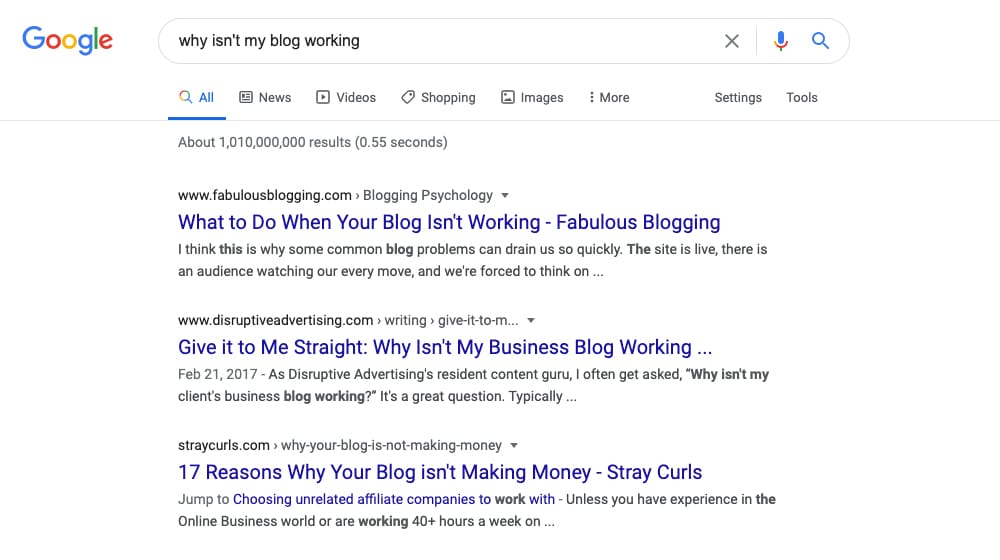
What I'm getting at here is that your choice of topic is crucial. It's the topic, not your name, not your brand, not your site design, that keeps people visiting. The more you pack your site full of content people are actively seeking out, the more people will visit your site. Eventually, you can leverage that audience into more visibility, more influence, more recognition, but when you're growing a blog, you need to focus on your content.
3. Quantity Over Quality
I just got done telling you that people tend to read one blog post and then leave. Some people take this information and decide that the solution is to write 10,000 blog posts, covering every topic they can think up. By providing answers to every possible question, they reason, they'll attract everyone looking for that kind of content.
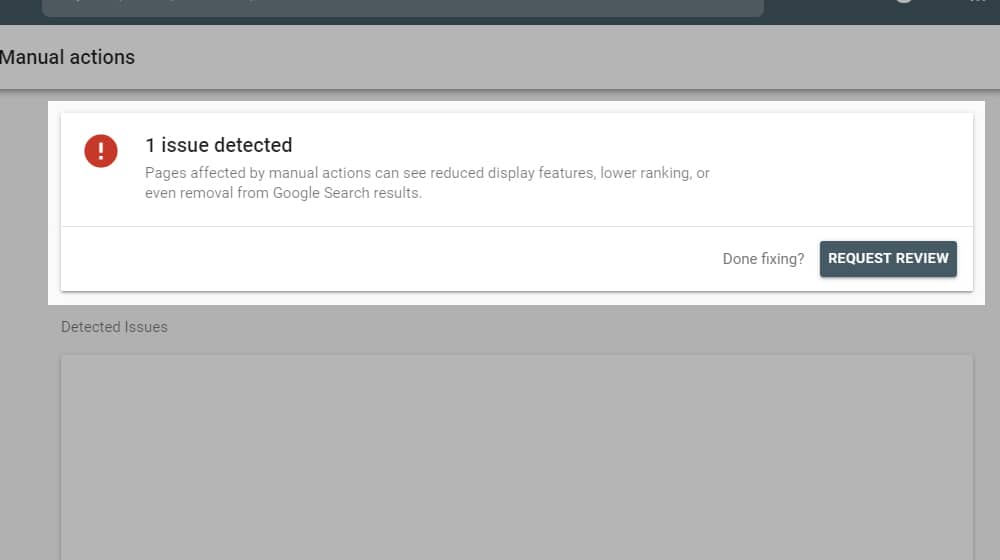
What happens is that none of those articles are very good – see problem #1 – and they end up not performing as you had hoped. They cannibalize each other's traffic when the topics are too similar. They don't have depth, so they don't out-compete people who have put more effort into their article and who are also providing articles on the same topic.
4. Giving Up Too Soon
One quality that is shared by virtually every business owner is impatience. We all want to see results for our efforts. In fact, for many of us, I would venture to say that the feedback loop of effort -> results -> growth -> reinvestment of effort is what drives and motivates us. Without it, we feel lost.
You can see this time and again, in all realms of life. Ask a child if they want one piece of candy now or two pieces of candy tomorrow, and almost all of them will take the candy now. The immediacy of results has been engrained into our culture and our species.
The problem is, blogging is a long-term investment. You're investing in a piece of content that is going to generate a trickle of blog visitors every day until the forseeable future. Very few people are going to be able to launch a new blog and have it profitable in under a year. Even fewer people can bring a blog into profits in under six months. Those that can are usually investing a huge amount of money in advertising and promotion, and they usually have other forms of success under their belt giving them name recognition out of the gate. If you're curious how long until blogging starts working, it generally takes most people between 1-2 years.
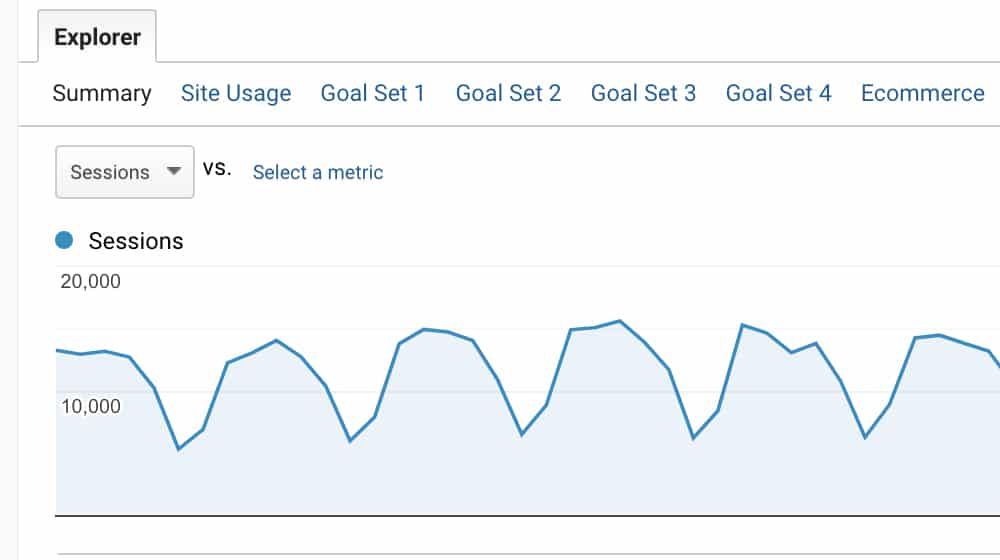
5. No Knowledge or Focus on SEO
How do people find content to read on the web? Traffic comes from several sources: search referrals, links from other sites, social media posts, and paid advertising. We can drop paid advertising, because I don't consider a blog successful if it only gets clicks when you're buying ads for those visitors. In fact, it sort of defeats the entire purpose of blogging - a one-time investment for a web page that yields long-term organic trafific.
Social media requires you to have an audience already. Your posts aren't going to be visible or shared without already having people interested in them. The same goes for links from other sites; you can't even get them if you don't have some established audience and clout to leverage.
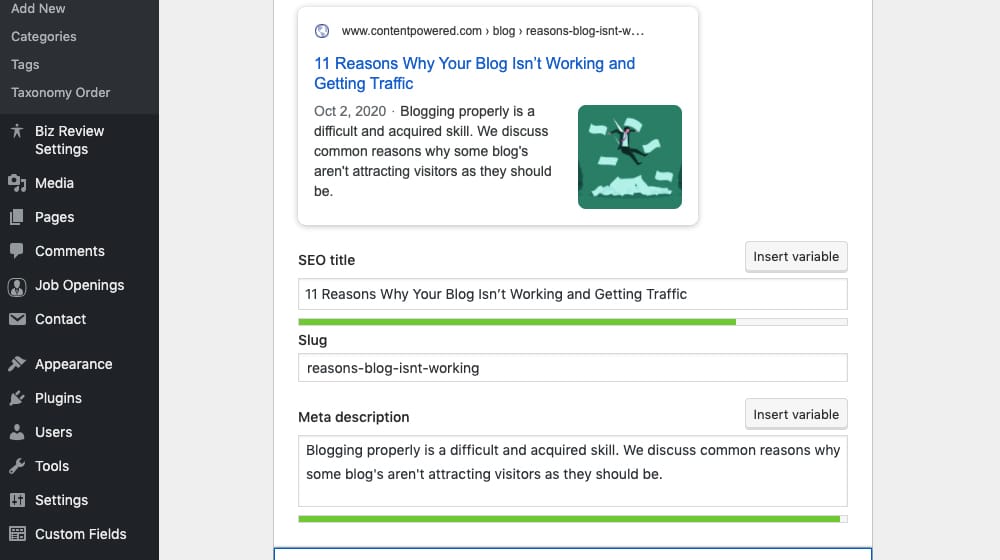
This leaves search engine traffic. Enter SEO: Search Engine Optimization. No blog is successful without some level of SEO in play. Oh, sure, you can give me a counter-example for every SEO rule, with a high-profile site that violates it. The thing is, it's virtually impossible to grow a successful website without SEO. People use search engines to find information, and if you have information that you want people to find, you want it listed on search engines.
6. No Consistency
How often should you post to your blog? Some people swear by daily updates, which is great if you have the team to help you publish 15,000 - 20,000 words of content each week. Others post once a week. I've even seen successful blogs that publish only one blog post per month.
The key is consistency.

When you're posting on a regular schedule, no matter how frequent or infrequent that schedule is, you're accomplishing two things.
- First, you're establishing a routine. If you go to the gym whenever you feel like it, chances are that you aren't going to very often or at all, but if you commit to going every Tuesday and keep an organized calendar and reminders, your chances of going every Tuesday improve dramatically.
- Second, search engines get a feel for your publishing habits and check on your website more regularly, ensuring that your new content is indexed quickly. It also gives your visitors (and search engines) some indication that your website is alive and that somebody is regularly working on it. If you haven't blogged since 2014, for somebody new who hasn't heard of your website yet, it may appear as if your website is no longer being maintained.
Consistently creating content also makes accounting and estimating your monthly costs and return on investment easier, as well as when you are reviewing data or when you decide to increase your posting consistency.
The bottom line is that consistency works and it keeps you on a schedule. If you plan to do something but you're not sticking with that plan, you're going to fail. A schedule is one of the best ways to help, which is why content calendars are an essential tool in every blogger's toolbox.
7. Failing to Address Bad Content
One mistake I've seen a lot of business bloggers make is improving their blog moving forward but not improving what already exists. Oh, fixing technical issues and design errors affects the whole site, but what about the content? If you've been producing mediocre content for years, buying quick low-quality articles from content mills, or getting spun content from a shady blog manager, that's a lot of harmful content that is weighing down your website.

Even if you've turned over a new leaf and started producing good content, the old content could be holding you back. Posts that could be good opportunities are instead black holes of value. Posts that could attract people are instead serving as a bad example and driving people away, plus they're preventing you from covering the same topic again. If you have 50 great new articles and 50 that are awful, search engines may look at your website as "average". Delete those 50 awful articles, and suddenly your average content quality is now "good".
Deleting articles that you spent money on is painful, but the improvement in your performance will almost always make up for it. Like anything else when it comes to blogging, it takes time, so be patient after a content audit. Search engines will take a while to de-list those pages from their search results and re-crawl your website.
8. No Oversight for Simple Errors
I get it. Running a business is a lot of work. Running a blog is a lot of work. You only have so many hours, so much energy, so much focus in a day. Something has to give. More often than not, it's something related to the blog. After all, how often does that extra editing pass give you a tangible return? You could be spending that time on a sales call instead!
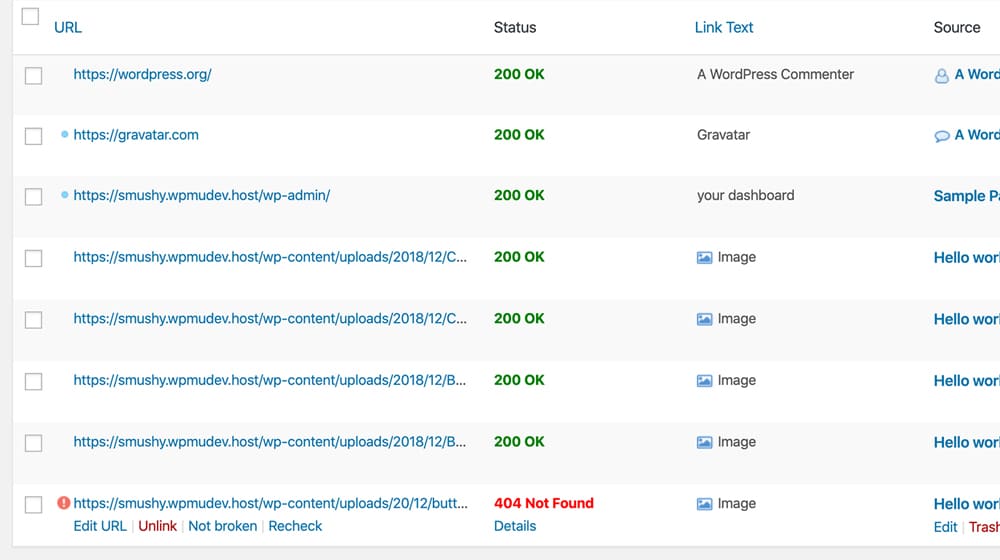
It's a job that someone has to do, though. Whether you're doing it or you hire a blog manager to do it, someone needs to monitor your site looking for basic errors. Spelling mistakes. Grammatical issues. Broken links. Basic meta information. Image alt text and captions. It all needs its share of attention, and you need to give it that attention, somehow.
9. Overly Promotional Content
Your blog is meant to drum up customers for your business, so it stands to reason that you should write about yourself, your product, and your store, right? After all, how else do you get people interested?

Except it doesn't work like that. Promotional content has a role, but if your blog is mostly full of it, it's never going to perform. Promotional content isn't trustworthy. It's not shareable, and people don't want to link to it. Search engines don't like it. Users don't like it. It doesn't solve problems, educate readers on anything other than yourself, or help them with their issues.
10. Technical Issues
One of the hidden killers of a website is technical problems. There are all sorts of issues that can get in the way of both users and search engines and prevent them from finding, ranking, indexing, and consuming your content.
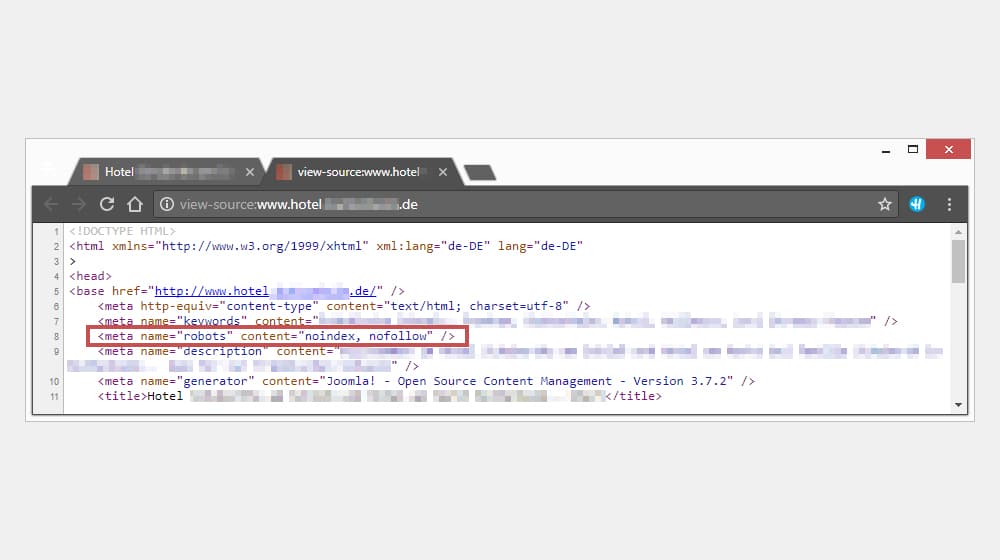
Many of those issues might not even be evident if you don't know what to look for.
Here's a partial checklist to get you started:
- Look for accidental uses of
noindexin meta tags. - Make sure meta keywords are empty.
- Don't load content with javascript.
- Check for Google blocks in robots.txt and .htaccess.
- Check web hosting uptime.
- Check the Google Search Console for search penalties.
- Look for hidden, spammy, or low-quality outbound links.
- Check your content for plagiarism.
- Make sure your site loads quickly.
- Make sure your site works on mobile devices.
There's a lot that goes into a successful site, so this is just a place to start. You can look for more technical audit guides online once you've got some idea of how deep you'll need to dig.
11. No Promotion
It has been decades since anyone has been able to build a website with zero promotion and somehow still grow it into a successful site. Modern websites need promotion to get off the ground. If you're already running a business, you have the ability to leverage that to promote your site. Beyond that, though, you should invest in various means of promotion to get people aware of and visiting your blog.
There are a lot of different ways to promote a blog, and you need to be doing at least some of them if you want to succeed.
Are you having issues with your blog? Let me know in the comments! I respond to all comments and I will do my best to help. Please share detailed information on your posting habits, word count of your articles, age of your blog, industry, platform, and other technical details. Kindly refrain from adding your blog URL to your comment - unfortunately we can't publish those.





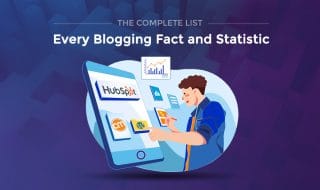


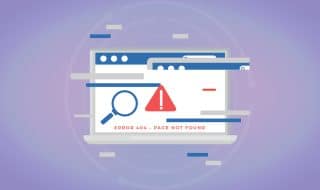

Comments